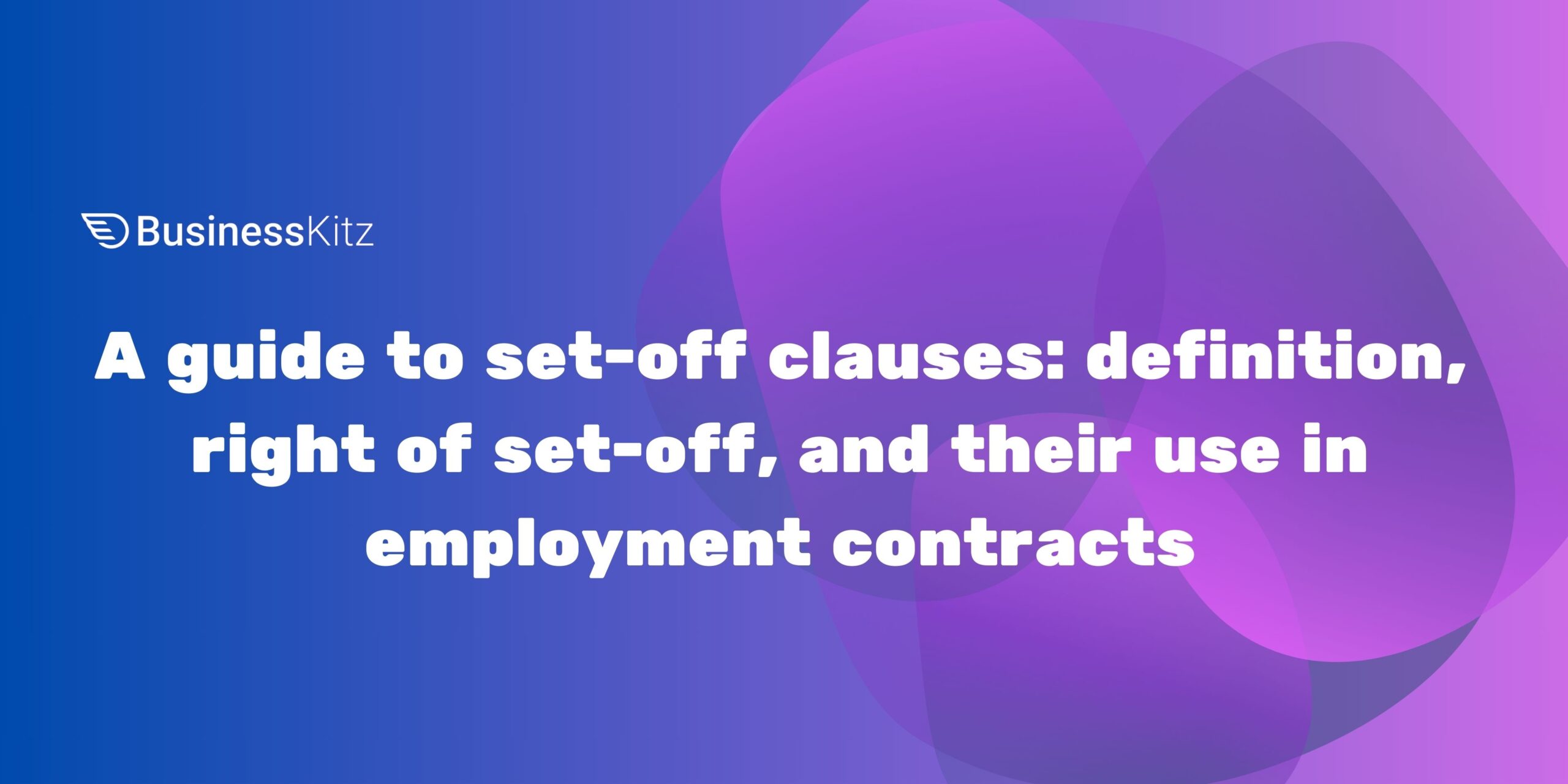
We've helped businesses save $55m with our all-in-one platform. Get instant access to this template and 115+ others, plus AI-powered document creation, starting completely free.
Understanding set-off clauses is crucial for managing contracts effectively. These clauses allow parties to balance debts or claims against each other, simplifying transactions and reducing financial risks. In business, employment, and finance, set-off clauses help ensure fairness and clarity in agreements. In this guide, we will explore the role of set-off clauses, their applications, and how to draft enforceable terms.
[ez-toc]
Set-off clauses are provisions in contracts that allow one party to offset a debt or claim against another. They simplify transactions by reducing the need for separate payments. These clauses are commonly used in business and employment agreements, helping to manage financial risks. To be enforceable, they must be clear, precise, and comply with Australian law.
A set-off clause is a provision in a contract that allows one party to balance a debt or claim against another. Instead of making separate payments, the clause lets parties offset what they owe. This can simplify transactions and reduce the risk of default.
Set-off clauses play an important role in contracts for businesses, employees, and lenders.
In Australia, set-off clauses must meet legal requirements to be enforceable. They depend on the type of clause used: contractual or equitable. Contractual set-off clauses are explicit provisions agreed to by both parties. Equitable set-off arises in fairness when no written clause exists.
Australian courts assess:
Set-off clauses are part of many contracts in Australia. They simplify payment obligations, ensure fairness, and reduce disputes. Including one can protect against financial risks in particular circumstances.

Set-off clauses are common in employment contracts. They let employers offset payments or liabilities against an employee’s entitlements. This means that money owed to the employee, such as wages or allowances, can be reduced by amounts the employee owes to the employer.
In Australia, set-off clauses are often included in contracts to simplify payment obligations. Employers may rely on these clauses to balance:
For example, if an employee receives an overtime allowance but owes the employer for damaged equipment, the employer can offset the debt against the allowance.
While set-off clauses can streamline transactions, they may also carry risks for employees. Key points to consider include:
Employees should carefully review contracts before signing. They should ensure the set-off clause is clear and legally compliant. Seeking advice from a lawyer or professional can help protect against unfair terms.
Set-off clauses can balance payments, but their impact depends on the contract’s terms and relevant laws.
Set-off clauses come in two main types: contractual set-off and equitable set-off. Each serves a unique purpose in managing payment obligations and resolving claims. Understanding their differences is essential for using them effectively in contracts.
A contractual set-off clause is explicitly included in an agreement. It outlines when and how parties can offset payments against debts. Since it is written in the contract, its terms are legally binding.
Key features of contractual set-off:
Equitable set-off is not written into the contract. Instead, it applies when fairness requires one party’s payment to offset the other’s debt. This type of set-off is recognised by courts based on the relationship between the claims.
Key features of equitable set-off:
AspectContractual Set-OffEquitable Set-OffDefinitionExplicit clause in a contract.Based on fairness, not written.Legal enforceabilityStrong, as stated in the contract.Limited to specific circumstances.Use casesCommon in employment and vendor agreements.Disputes over related claims.Key requirementClear, agreed-upon terms.Close connection between claims.
Contractual set-off provides certainty, while equitable set-off addresses fairness in particular circumstances. Knowing which type applies helps parties manage their rights and obligations effectively.

Set-off clauses play a key role in business contracts. They help businesses manage payment obligations and reduce the risk of unpaid debts. From vendor agreements to service contracts, these clauses can provide practical and legal advantages.
Set-off clauses are often included in:
To avoid risks:
Set-off clauses give businesses a tool to manage cash flow effectively, but they must be carefully drafted to ensure fairness and legal compliance. Consulting a legal professional can help address these concerns.

A well-drafted set-off clause provides clarity and reduces disputes. To ensure enforceability, it should be precise and aligned with Australian law. Here’s how to draft a strong clause:
A well-structured set-off clause gives parties confidence and minimises disputes. Consulting a lawyer with expertise in Australian contract law can help ensure the clause meets legal standards and the needs of both parties.
Legal advice can make a big difference when drafting or negotiating set-off clauses. A lawyer ensures the clause is clear, enforceable, and complies with Australian law. Here’s why you should consult a legal expert:
Consulting a legal expert ensures your set-off clause is robust and legally sound. This advice can save you from costly mistakes or legal troubles down the track.
Set-off clauses are essential tools in contracts, providing a way for parties to manage payments and obligations. Understanding these clauses is crucial for businesses, employees, and legal professionals. Here are the key takeaways:
A set-off clause is a provision in a contract that allows one party to balance their debt against what the other party owes them. This provision simplifies payment obligations and reduces the risk of non-payment in business agreements or employment contracts.
In employment contracts, a set-off clause allows an employer to deduct any money owed by the employee, such as for overpaid wages or advances, from their entitlements. It’s important to ensure these deductions comply with legal standards, and the contract clearly outlines the terms of the set-off.
A contractual set-off is explicitly stated in the contract and defines when and how the set-off applies. An equitable set-off, on the other hand, arises from fairness and is used when there is a close relationship between the claims, even if no explicit clause exists. It’s important to understand the difference to use each type effectively.
You should seek legal assistance when drafting or reviewing a contract with a set-off clause. A lawyer ensures the clause is clearly structured, compliant with Australian law, and protects both parties’ interests. For complex agreements or disputes, expert legal advice is crucial to avoid costly mistakes.
Yes, set-off clauses can be mutual. This means both parties have the right to offset their debts against each other. A mutual set-off clause simplifies payment processes and can be beneficial in resolving disputes between the parties involved.
While a set-off clause can reduce the risk of unpaid debts and streamline transactions, risks include unclear language, potential conflicts with legal obligations, or disputes over fairness. It’s important to carefully draft the clause, define its scope, and ensure it aligns with relevant laws to avoid complications, especially between creditors and debtors.
Set-off clauses play an important role in many contracts, from employment agreements to business deals. They provide a way to offset debts, manage risks, and simplify transactions. However, drafting these clauses requires careful attention to detail.
If you are unsure about a set-off clause or its impact, consulting a legal expert is always a good step. Lawyers can help ensure that your clauses are clear, enforceable, and compliant with Australian law.
By understanding how set-off clauses work, you can manage your contracts more effectively. Whether you’re a business owner, employee, or legal professional, knowing when to seek advice is key to keeping your contracts fair and legally sound.
Disclaimer: This content is intended to be used for educational and informational purposes only. Business Kitz does not offer legal advice and cannot guarantee the accuracy, reliability, or suitability of its website content for a particular purpose. We encourage you to seek professional advice from a licensed professional and verify statements before relying on them. We are not responsible for any legal actions or decisions made based on the information provided on our website.
Unless expressly stated otherwise, all content, materials, text, images, videos and other media on this website and its contents are the property of their respective copyright owners.
Copyright © 2025 Business Kitz 14312161